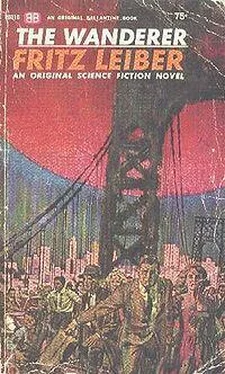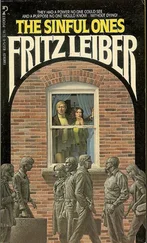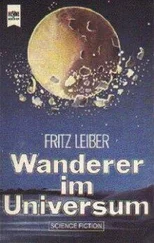They were moving forward — a foot — five — fifteen — then they were going faster, and Hester was saying, “Don’t hit that stump, Benjy!” and the Rolls veered abruptly and veered again, and then they were going faster still, and Benjy was laughing his whooping laugh, only this time it was pretty hysterical, and finally he was wheezing, “Old KKK sho live up to his name!” He glanced back. ” ’Scuse me…Dad!”
Hester said, “He cain’t hear you, Benjy. He pass out again. It take all his stren’th.”
Helen stared back wide-eyed. “I never suspect he Kluxer.”
Hester said: “You just be grateful, gal.”
Doc took charge of the business of striking the rock-slope camp, as greenish dawn shifted through chartreuse to lemon yellow. He operated with a high-handed mysteriousness that would have been even more irritating if it hadn’t been for his sardonically-tinged high spirits. In particular, he refused to discuss the question of their next objective or the problem of the boulder-block until they were organized for departure.
He scaled down by one-third the breakfast ration Ida and McHeath presented for approval, prescribed penicillin for the flushed and fretful Ray Hanks on the latter’s recollection that he wasn’t allergic to it, and answered with a curt headshake Hixon’s suggestion that they make this a permanent camp and send out foraging parties.
The two sedans were searched. In the glove compartment of the first there was turned up a loaded .32 revolver and on its back seat a black hat. Doc appropriated both objects for himself, clapping the hat on his bald dome with a grinningly callous, “It fits.”
Wojtowicz, resting his left hand on his belt to ease his bandaged shoulder, protested: “Don’t wear that, Doc, it’d be bad luck,” while the Ramrod said somberly: “I wouldn’t want my head contaminated by particles from a sadistic murderer’s aura.”
“And I don’t want mine worse sunburned than it is,” Doc laughed back at him. “Murderer’s dandruff I can stand.”
The first sedan coughed and purred at once when Doc turned the ignition key and touched the gas to test it, but the second’s battery seemed to be dead. Doc refused to let Wojtowicz study around under the hood, but as soon as it had been drained of gas and oil, he let off the emergency, cut its wheel sharp, and ordered the others to help him push it off the road down the rock slope.
It went over the edge with a fine scrape and bound, and five seconds later its crash drifted up, shortly followed by three buzzards.
Doc snapped his fingers and muttered: “Certainly didn’t mean to disturb their breakfast, if it’s what I think it was.”
Mrs. Hixon heard him and made a sick face.
Next Doc tested the red Corvette, cutting it back and forth dashingly, tires on the road’s edge. “Sweet job,” he commented as he stepped out. “This is for me.”
As breakfast was finishing he quietly gathered Hunter, Rama Joan, Margo, and Clarence Dodd and drew them off with him back of the truck.
“Well, what is it?” he demanded of them. “Do we keep on for the Valley or cut back to Mulholland and try for Cornell or Malibu Heights? Got to keep this outfit moving or it’ll lose heart.”
“If we decide on the Valley, how do we get around the boulder?” the Little Man asked.
“Table that one, Doddsy,” Doc told him. “First things first.”
Hunter said, “A few of us could take the sedan and scout the Valley.”
Doc shook his head decisively. “Nope, we can’t afford to split up this outfit. It’s too small.”
“I know some artists in Malibu,” Rama Joan began tentatively.
“And I know some on Cape Cod,” Doc shot at her with a grin and a wink. “They’re probably swimming for Plymouth Rock.”
“But I was going to say,” Rama Joan went on with an answering grimace, “I vote for the Valley.”
“Anyone know the Valley’s elevation?” the Little Man asked. “It could be flooding from around the mountains.”
“We’ll find out,” Doc answered with a shrug.
“It’s got to be the Valley,” Margo put in. “Vandenberg Three’s at the foot of the Mountainway. And I think you all know that I want to give the inertia gun to Morton Opperly.”
Doc looked at their faces. “The Valley it is, then,” he pronounced. “I do think, though,” he remarked to Margo, “that momentum pistol might be a better name for it.”
“But the boulder—” the Little Man began.
Doc showed him a palm. “Come on,” he said to them all and headed past the truck and bus for the boulder.
As they went by, Bill Hixon asked with a jokingness that was three-quarters antagonism: “Well, doctor, has your executive committee decided on our further tasks for today?”
“We’re keeping on for the Valley,” Doc said sharply, “where we will resupply ourselves and contact responsible Moon Project scientists. Any objections?”
Without waiting for any even slightly delayed answers, he took a stand on the slope just above the boulder and motioned Margo to come up.
“I saw the boulder rock,” he explained, “when you slammed that gunman against it. Give it three seconds of down-trigger from here and I bet she rolls. Spread out of the way, everybody!”
Margo took the momentum pistol from her jacket, then suddenly turned and gave it to Hunter.
“You do it,” she told him, delighted to realize that she no longer needed the big gun to give her a feeling of security and excitement — that, in very fact, she herself was now the big gun she could rely on and experiment with. She also noted with satisfaction the sour hungry look in Hunter’s dark-circled eyes.
He crouched and firmed the gun in both hands. He’d been told it had absolutely no recoil, but his body refused to believe that. All his muscles tightened. From the corner of his eye he saw Doc wave. He pressed the button.
Whatever field or force the pistol generated, its effect was cumulative, as if the boulder had to soak it up. At first the great rounded rock didn’t move at all — long enough for Hixon to say: “Look, it isn’t—”
Then the side nearest Hunter began to lift, slowly at first, then faster. McHeath cried: “It’s moving!”
It overbalanced. Hunter snatched his finger off the button. The boulder came down on the rock slope with a tremendous clank, then crashed over and over, seeming at first to move just a little faster than a rolling boulder should.
The whole rock slope shook. Some of the people clutched at those nearest them.
A final crash carried the monster over the edge, from which it took a wide shallow bite of stone.
The Little Man said loudly, pulling out his notebook: “That is the most amazing demonstration of impossible physics that I have ever—”
A great sullen thud drowned his voice. The rock slope vibrated again as the boulder hit below.
Hunter looked at the scale on the pistol and said, “Still a good third of the charge left.”
Doc studied the spot where the boulder had rested. There was a smooth two-foot dip in the asphaltoid, deepest on the downslope side where the black stuff was squeezed out in a lip that smoothly joined the rock. Abruptly Doc nodded approvingly.
“I’m not so sure,” Hunter said, coming down the slope. “A skid sideways—”
But Doc was already striding back toward the red Corvette.
Two of the three buzzards — presumably they were the same — came winging up from the depths, heading away from the road. But there they ran into a big, two-rotor military ’copter which had come droning from the direction of the Valley during the excitement. The birds veered off from it and headed back.
Hixon was for signaling the ’copter with his gun, but Doc said: “No, we’ll take care of ourselves. Anyhow, they can see us, and if that boulder didn’t fetch ’em, nothing would.”
Читать дальше










